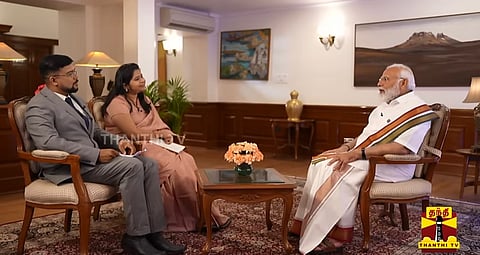

In his first reaction to the electoral bonds scheme which was deemed unconstitutional by the Supreme Court, Prime Minister Narendra Modi said that the issue has not caused a setback to the Bharatiya Janata Party. The response came in an interview aired by Thanthi TV on Sunday, March 31.
When the interviewer asked whether the electoral bonds issue had caused an embarrassment or a setback to the party, PM Modi said, “Tell me what have we done that I should see as a setback? I firmly believe that those dancing over the issue and taking pride in it are going to regret it. Before 2014, there was no trail of funds given to political parties during elections. Which agency can say where the money was sourced from, who did it go to and who spent it. Because Modi made electoral bonds, we can now search who bought the bonds, where it went, and how it was spent.”
However, this is not true. It was only after the Supreme Court ordered the State Bank of India (SBI) to disclose information on both the buyers and the beneficiaries of the bonds that the details of who bought the bond and whom they paid to was made public.
Responding to a question on the alleged misuse of the Enforcement Directorate (ED) against opposition parties, the Prime Minister said every central agency acts in an independent manner. “We neither obstruct nor direct its actions. It should work independently and is evaluated by the scales of the judiciary. ED has nearly 7,000 cases at present, of which less than 3% involve politicians. During the last 10-year tenure of the Congress government, the amount of money seized was only Rs 35 lakh while we have seized Rs 2,200 crore,” he said.
Commenting that the Prevention of Money Laundering Act (PMLA) had existed even during Congress rule, Narendra Modi said it was not used by them properly. “The PMLA law has existed since before, but they did not use it. Over 150 court cases were filed to exempt [individuals and companies] from the PMLA law. The Congress used the judiciary as a weapon as they know that Modi’s actions against corruption won’t stop,” he added.
Electoral Bonds were paper instruments that anyone could buy from the State Bank of India and give to a political party, which could redeem them for money. It allowed political parties to get away without making any significant disclosure to the Election Commission, as the bonds were designed to be anonymous. The Supreme Court deemed the scheme as unconstitutional on grounds that the public had the right to know who gave money to political parties.
The Supreme Court ordered the SBI to disclose information on both the buyers and the beneficiaries of the bonds. The bank was asked to give the data to the Election Commission by March 6, which would then make it public. The bank asked for an extension, which the court rejected. The first set of data was made public on March 14.
Read stories under Project Electoral Bond here